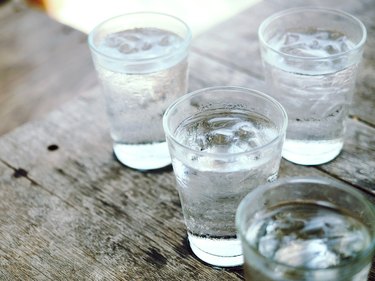
Drinking water is usually a healthy thing to do. Water has no calories. It keeps you hydrated. It regulates your body temperature. It does all this and more, for zero calories. Yet drinking water alone won't wipe out the effects of a bad diet.
Tip
Drinking water is good for you. Drinking water will not, however, counteract the effects of a junk food diet. Still, if you are drinking water instead of sweetened beverages, you can make some difference in your diet.
Video of the Day
Water and Junk Food?
Water makes up about 60 percent of your body weight. Your body depends on water to survive, according to the Mayo Clinic. What your body doesn't need to lose weight, according to numerous studies, is junk food.
Video of the Day
If you eat fast food regularly, you are more likely to develop obesity, according to a review of studies of people who ate fast food more than once a week. The review, published in the January 2016 journal Health Promotion Perspectives, found that those who ate fast food one to three times a week had a much higher rate of obesity.
If the junk food you eat is processed food in general, a study in the May 2019 issue of Cell Metabolism showed that adults who ate a diet of highly-processed foods took in more calories and gained more weight than those who ate minimally-processed foods. The study was small, only 20 adults, but participants were provided with bottled water and snacks. Those who ate the highly-processed foods ate more than those who ate the minimally-processed foods.
Water Can Help — Somewhat
On the other hand, drinking water in place of high-calorie beverages can do your diet some good, according to a February 2016 study in the Journal of Human Nutrition and Dietetics. This study of 18,311 adults found that when adults increased their water consumption by 1 percentage point, their total daily calorie intake dropped from 68 to 205 calories.
In the Journal of Human Nutrition and Dietetics study, University of Illinois kinesiology and community health professor Ruopeng An also found that people who increased their water consumption by one to three cups per day decreased their sodium intake by 78 to 235 milligrams daily, and their daily cholesterol intake by 7 to 21 milligrams.
The takeaway, according to An, is that replacing beverages that contain calories with plain water can make a difference in your overall health. Study participants drank an average of 4.2 cups of water a day. They did this while eating an average of 432 calories a day from low-nutrition, calorie-dense foods, such as desserts, pastries and snack mixes. In other words, junk foods.
Where to Start
If you've tried to change your diet and haven't been successful, swapping out drinks containing calories for water is a start. According to Harvard Health, half the U.S. population consumes sugar-sweetened drinks each day, and one in four get at least 200 calories per day from such drinks.
Five percent get at least 567 calories each day, equal to four cans of soda. Yet, the U.S. Dietary Guidelines recommend no more than 10 percent of daily calories come from added sugar.
The Centers for Disease Control and Prevention recommends the following tips to help you drink more water:
- Carry a water bottle for easy access when you are at work or running errands.
- Freeze some water in freezer-safe water bottles for quick access to cold water.
- Choose water instead of sugar-sweetened beverages. Substituting water for one 20-ounce, sugar-sweetened soda will save you about 240 calories.
- Choose water when eating out.
- Add a wedge of lime or lemon to your water to improve the taste.
- Mayo Clinic: "Water: How Much Should You Drink Every Day?"
- Health Promotion Perspectives: "Fast Food Pattern and Cardiometabolic Disorders: A Review of Current Studies"
- Cell Metabolism: "Ultra-Processed Diets Cause Excess Calorie Intake and Weight Gain: An Inpatient Randomized Controlled Trial of Ad Libitum Food Intake"
- Harvard Health: "Sugary Drinks"
- Health.gov: "Dietary Guidelines for Americans 2015-2020"
- Centers for Disease Control and Prevention: "Water & Nutrition"
- Journal of Human Nutrition and Dietetics: "Plain Water Consumption In Relation to Energy Intake and Diet Quality Among US Adults, 2005–2012"
- University of Illinois News Bureau: "Drinking More Water Associated With Numerous Dietary Benefits, Study Finds"
- NAL.USDA.gov: Nutrient Data Laboratory